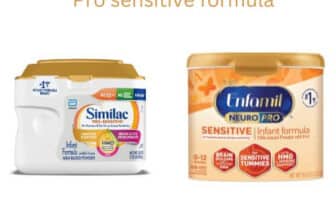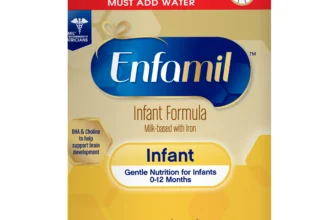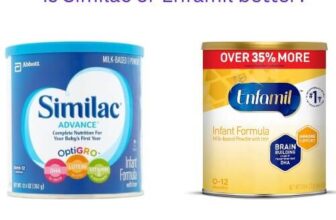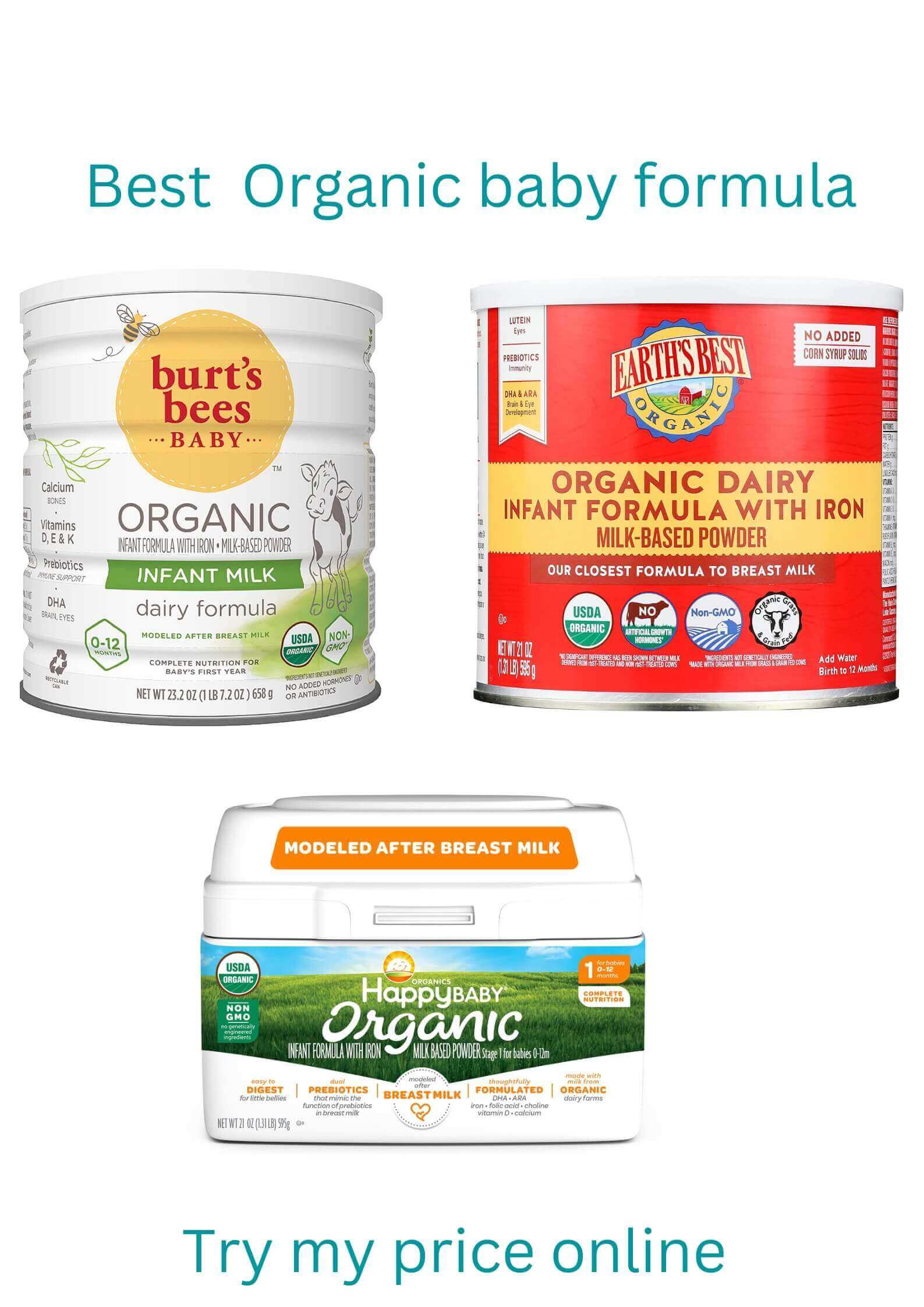
Have you ever asked yourself what the best organic baby formula is? The tendency to move away from regular formula to organic baby formula might be compelling due to the need to avoid the chemicals in regular formula. And when you decide to move away from inorganic or regular formula, you want to ensure that you are going for the best organic baby formula.
In this article, we will explore what organic formula is, the regulations, and all you need to know about the best organic baby formula. Then we will talk about whether an organic baby formula is better than regular formula and the pros and cons of organic baby formula. It will be interesting to know whether there is any difference between organic and regular baby formula, the digestive process, and how easy it is. As with any baby formula, we will gleam into whether organic baby formula causes any issues in babies and if any, what feeding issues the formula addresses. We promise this is a bespoke review of the best organic baby formula. Stay reading as we break down the details one after the other.
What is organic formula?
The phrase organic baby formula in simple terms is the formula industry grown and made to a certain degree without any enhancing chemicals whatsoever. In the United States, for a formula to pass as organic formula, it is required by the U.S Department of Agriculture (USDA) that such a formula has been cultivated and has passed through a recognized process by federal guidelines. That speaks to the quality of soil, pest and weed control. What additives were used in growing the formula, and how the animal was raised. Also, the factors used are limitless. Based on the USDA guidelines, manufacturers of organic baby formula rely solely on natural substances and “physical, mechanical or biologically-based farming methods” as much as they can to avoid going against the regulations.
For a formula to pass as organic in the United States, it is not just for the formula to be labeled organic. Rather, such a formula must have been grown as practicable without the prohibited substances for a period of three years before harvest.
A strict guideline that can not be waivered is that the baby formula must have at least 95% of its ingredients organic before the USDA can certify such formula as organic.
Forbes Health notes that the regulation does not stop with the USDA. The Food and Drug Administration provides requirements that must be met before a baby formula can be marketed for the shelf or stores in the United. What is required is that the formula must meet nutritional specifications of a minimum of 9 nutrients and a maximum of 29 nutrients.
Ultimately, organic baby formulas are made from milk gotten from cows that were grass-fed.
The benefit of Organic baby formula
It is ripe to know the benefits of organic baby formula as we have understood what organic baby formula is.
- Organic baby formulas are free from pesticides.
- They are free from chemicals.
- They do not use hormone-enhancing substances.
- They are easier to digest due to no chemicals.
- Organic baby formula are highly rich in nutrients.
- They do not contain any added unnatural sugar.
- When you purchase organic formulas, you are supporting more organic farming practices.
What are the 3 types of baby formula?
There are 3 types of baby formula, and they are all regulated by the Food and Drug Administration to ensure that they are safe for commercial consumption. Mayo Clinic lists them as below:
- Cow milk protein-based formula: When you talk about a formula formulated to resemble breast milk, cow milk-based is the leading formula for infants. It provides infants with all nutrients needed to grow and develop through the years. And one important fact about the protein cow milk-based formula is that it is made so it can be easily digested by infants whose digestive system is still fragile. Study shows that most infants enjoy taking cow milk-based formula. However, a certain percentage of them who have allergies to protein in cow milk may have to take another type of baby formula.
- Protein hydrolysate formulas: This formula is made for babies who are allergic to cow’s milk and soy-based formula. The protein hydrolysate formulas are proteins that have been partially or totally broken down into bit sizes when compared with soy-based formulas or cow’s milk formulas. As stated above, when any baby finds it hard to digest cow milk protein-based formula, they need the protein to be broken down for an easy digestive process. This is where the protein hydrolysate formulas come in.
- Soy-based formulas: The soy-based formulas are made for babies who can not tolerate the protein in cow’s milk or if you feel as a parent that you do not want your baby to feed on animal proteins. It is reputed to be suitable for lactose-intolerant babies. Cow’s milk contains lactose, a carbohydrate. Though, physicians say that babies who find it hard to tolerate cow’s milk may also find it hard to tolerate soy milk.
You should explore any of these formulas as it pleases you and as much as your infant can tolerate any of them.
What organic formula is the best?
First, we will like to state here that, to come up with what organic baby formula is the best, we had to put into consideration some important factors to arrive at the picks. These factors range from what pediatricians have recommended, the FDA and USDA-certified organic baby formula, and what mothers are saying when it comes to the review of organic infant formula.
We know you are enthusiastic about finding out the best organic formula, read below for more information.
Earth’s Best Organic Formula
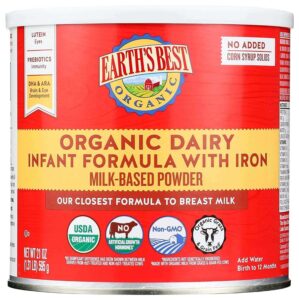
Earth’s Best Organic Formula
The Earth’s Best Organic Formula is the first among the best organic formula we will be considering. It is made from non-synthetic fertilizers or pesticides. And as a USDA-certified formula, they offer your infant all-around nutrition. They contain nutrients like lutein, ARA, DHA, and prebiotics that help your infant develop their brain, immune system, gut, and eyes.
Pros
- They do not contain nutrients enhancing hormones for artificial growth.
Cons
- Mothers have complained that it has a strong smell and they sometimes find it hard to mix.
Reviews Of Earth’s Best Organic Formula
“Amazing formula. We put baby on this at 1 week old because of severe diarrhea that caused horrible diaper rash. No help from pediatrician who said “it’s because babies first few bowel movements are highly acidic” or some such nonsense. Put her on this, found at my local Walgreens, diarrhea stopped the same day. We’ve had zero spit up and zero stomach issues. I highly recommend this formula.”
-TABATHA
Happy Baby Organic Infant Formula
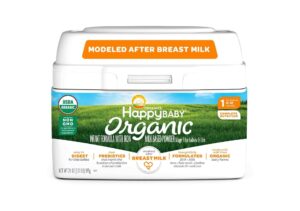
Happy Baby Organic Infant Formula
The Happy Baby organic formula is the ideal infant formula for your baby’s growth and development as it contains essential nutrients as required by the FDA before it can be certified for consumption by infants. Happy baby organic infant formula is rich in cow milk that is gotten from cows raised on natural grass. Also, it is reputed amongst mothers to be the best formula when you want to switch your baby back and forth between breast milk and infant formula. The reason for this is as stated above: it is properly formulated to resemble breast milk. Thus, there is no large difference between both kinds of milk for an easy transition.
Pros
- It is perfectly formulated to resemble breast milk.
Cons
- It foams a lot when you mix it in a feeding bottle.
Reviews of Happy Baby Organic infant formula
“Happy Baby Organic Formula – little one loves it and you can get it at Target or Wegmans. … We tried this one first and he’s done great.”
“…The first ingredient of Happy Baby is lactose– milk. I can’t tell you the difference in my baby in just one day. It’s a total turnaround. He’s happy again, he isn’t crying hours on end, he doesn’t have bad gas, he’s playing more and has less reflux. Today is day 2 and we are all so amazed. After 7 weeks of struggle, I can’t say enough good about this product and how thankful I am this is available.”
-DANIELLE
Burt’s Bees Organic Infant formula
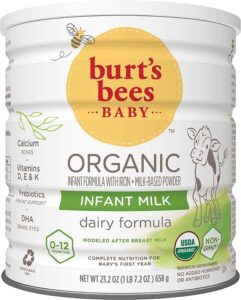
Burt’s Bees Organic infant formula
Burt’s Bees Organic Infant formula is worth mentioning among the best organic formula on the market. It is scientifically proven to contain all the nutrients your infant need for growth and development.
Pros
- Burt’s Bees is formulated with DHA an essential nutrient in eye and brain development, and it is rich in other nutrients which support your baby’s growth through their first 6-12 months.
Cons
- Reports by mothers reveal that the formula causes constipation once in a while.
Reviews of Burt’s Bees Organic formula
“I was looking for the best baby formula on the market and after comparing and trying a couple of them I finally found this one! It’s organic, doesn’t use any corn fructose and solids, and is very well digested by my 1-month-old.”
-ERIC BYRON
Does organic formula cause constipation?
It is rare to have an organic formula that causes constipation in babies. If at all, such a formula must contain ingredients that makes the organic baby formula cause constipation. An example may be a formula that contains palm oil as stated by Colic SOS.
Another reason organic formula may cause constipation is that they come thicker than breast milk, and since infants do not have a perfectly developed digestive system, they may find it hard to digest such formula.
Though the question might go around, it is hard to really spot a baby with constipation problems. Sometimes, most of what mothers think is constipation might be a baby learning to use their developing muscles.
However, to answer the question, does organic formula cause constipation? No, organic baby formulas do not cause constipation except when they contain ingredients that cause constipation in your baby. When you notice this, you may want to stop feeding your baby with the formula and consult your pediatrician immediately.
Does organic formula matter?
Whether organic formula matters depend on your baby’s needs or how much you can afford to spend on getting your baby’s food. Also, it could depend on your choice. Some mothers have reported that they prefer feeding their babies organic formula to other infant formulas. Therefore, organic formula matters to you based on your baby’s needs, your choice and your pocket.
What is the difference between organic and regular baby formula?
This question often pops up severally among mothers on the difference between organic and regular baby formula. But the difference is not clear-cut as both are organic formula and regular baby formula made from the same cow milk or soy. The only difference is that other regular formulas contain hormone-enhancing substances, chemicals, and pesticides compared with Organic formulas that are free of these. The absence of the above-mentioned is the only reason organic formulas are different from other regular formulas.
However, kindly note that whether organic or regular infant formula, they are both certified by the FDA for safety before they are allowed to be sold or consumed by infants.
Can I give my 1-year-old organic whole milk?
At age 1, babies need whole milk rich in the required nutrients for their development, especially the brain and eye development. Organic whole milk is said to be the perfect type of milk to give to your baby from age 1. What to expect says age 1 is the legal age that qualifies your baby for feeding on organic whole milk.
Is organic formula easier to digest?
Yes, since organic formulas contain no added chemicals and gotten from cows that were grass-fed as against pesticide-fed cows, they are noted to be rich in vitamins and minerals and easier to digest when compared with other types of infant formula. The only downside to organic formulas is that they can be expensive when compared with other regular formulas.
References
Infant and toddler health – in-depth infant formula
Could palm oil cause constipation in babies?
Baby formula and constipation -what you need to know
Best formula for reflux spit-up
Is organic infant formula healthiest?
Eating and nutrition – Introducing cows milk.
Organic baby formula – our-picks
Organic 101 – what usda organic label means



